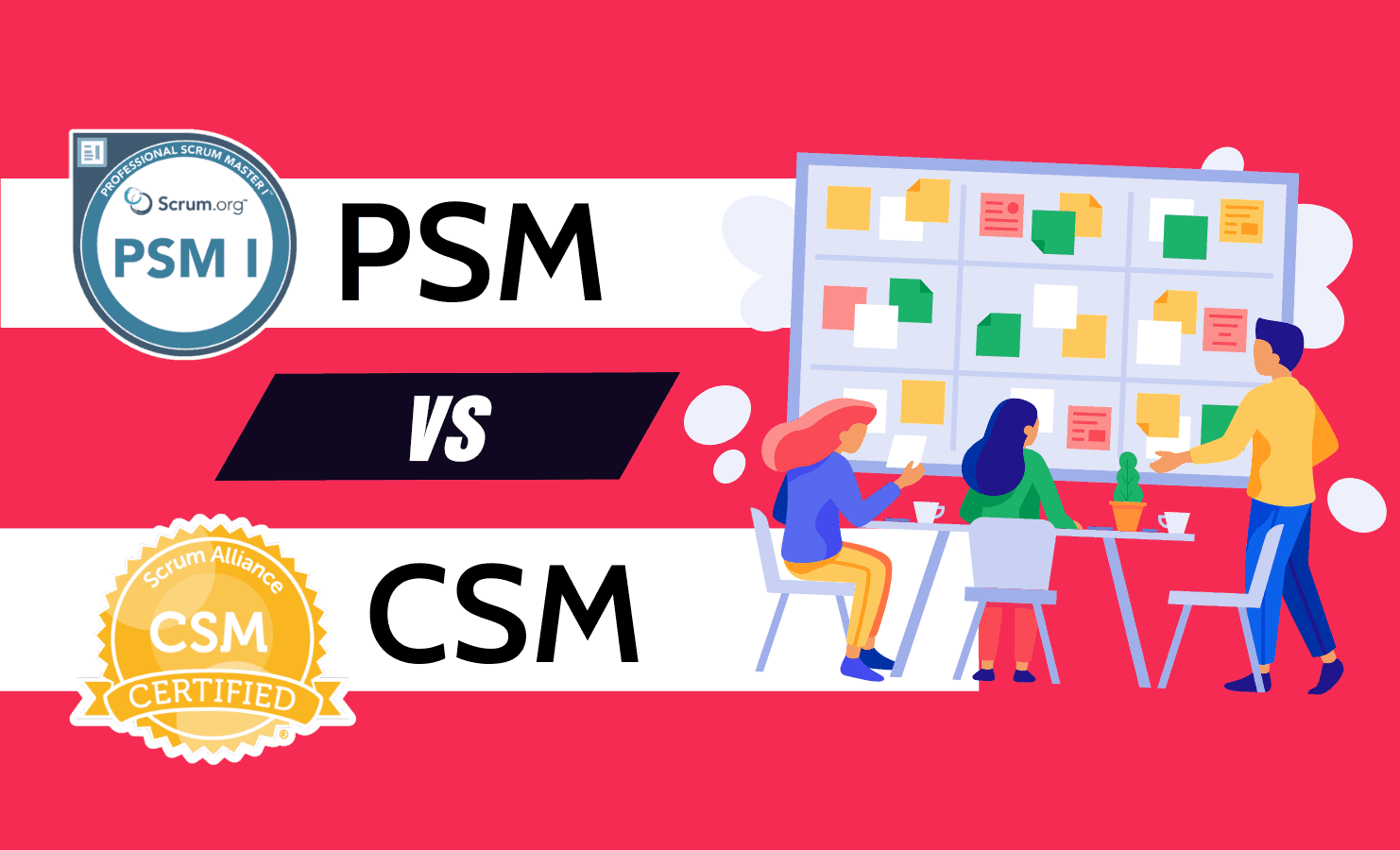
Why you can trust us
- 407 Cloud Software Products and Services Tested
- 3056 Annual Software Speed Tests
- 2400 plus Hours Usability Testing
Our team of experts thoroughly test each service, evaluating it for features, usability, security, value for money and more. Learn more about how we conduct our testing.
Key Takeaways: PSM vs CSM Certification
- The main difference between the Professional Scrum Master (PSM) and Certified Scrum Master (CSM) certifications is that the PSM requires no formal classroom training. In contrast, the CSM requires a minimum of 14 hours of certified training.
- Both certifications are offered by organizations that hold high standards in the agile world, which means you’ll gain credibility with either certification.
- The PSM certification does not need to be renewed, whereas the CSM certification must be renewed every two years.
Facts & Expert Analysis About Scrum Master Certifications:
- PSM Earnings: Scrum masters holding the PSM can earn on average $120,688 annually in the U.S.2
- CSM Earnings: Those with the CSM certification can earn on average $112,999 annually in the U.S.1
- Scrum Master Jobs: Demand for scrum masters is high, with the projected number of job opportunities expected to grow 9% by 2028.3
Those looking for a career in agile project management will find it highly competitive. However, there are plenty of project management certifications for those looking to start their agile journey. The Professional Scrum Master and Certified Scrum Master certifications are ideal for aspiring scrum masters. We’ll break down each certification in this PSM vs CSM guide.
In the following sections, we’ll explain which of the two certifications could suit you better, and we’ll show you how much you can expect to earn, what to expect from the exam and how to get your hands on either certification. If you’re ready to level up your career, earn more and use the best project management software to lead your scrum team to glory, read on.
Meet the experts
Learn more about our editorial team and our research process.
PSM vs CSM Certification: Which Is Better for You?
Though both certifications will help you secure jobs as a scrum master, each certification differs slightly and will appeal to different people. Below, we’ll break down each offering and define the individuals that each certification is best suited for.
PSM Certification Is Better For:
- Individuals with a tight budget: You do not need to attend expensive training courses to sit the PSM exam, which costs just $200.
- Those who prefer self-paced study: Study as much as you like and take as much time as you need to learn the material for the PSM exam.
- Deeper knowledge: The PSM certification is ideal for those who wish to gain a deeper understanding of the scrum framework and those who want to become a certified scrum trainer at a later date.
CSM Certification Is Better For:
- Those who prefer structured learning: If you prefer classroom (virtual or in person) settings, the CSM certification, which a certified scrum trainer must teach, is for you.
- Practical application: If you’d rather learn about scrum, how to apply it in real-world scenarios and how to work with scrum teams, the CSM course might suit you better.
- Scrum career progression: The CSM is better for those wishing to move into other scrum roles down the line, such as a certified scrum product officer (CSPO) or a certified scrum developer.
CSM vs PSM Comparison at a Glance
The table below compares the PSM and CSM certifications. We’ll cover each certification in more depth in later sections.
| Features: | PSM | CSM |
|---|---|---|
| Accrediting Bodies | Scrum.org | Scrum Alliance |
| Certification Passing Scores | 85% passing grade | 37/50 correct answers required to pass |
| Certification Prerequisites | No prerequisites — you do not need to attend a PSM course. | Must attend a training course that’s at least 14 hours long and led by a certified instructor. |
| Training Duration | Self-paced | 14-16 hours over two days |
| Exam Costs | $200 per attempt | Two exam attempts are included in the course cost. There’s a $25 fee if you fail both attempts. |
| Exam Preparation | Self-study or attending a non-mandatory training course | 14 hours of course study required |
| Exam Format | 60 minutes, 80 multiple-choice questions | 60 minutes, 50 multiple-choice questions |
| Renewal Requirements | No renewal required | 20 SEUs, $100 every two years |
| Potential Opportunities | High-profile scrum master roles | High-profile scrum master roles |
| Salary Potential | Average of $120,688 annually2 | Average of $112,999 annually1 |
What Is PSM (Professional Scrum Master)?
The Professional Scrum Master certification is the first of three PSM certifications for aspiring scrum professionals that scrum.org offers. The PSM is the ideal certification for those who want to prove they have deep scrum knowledge and the ability to successfully lead a scrum team.
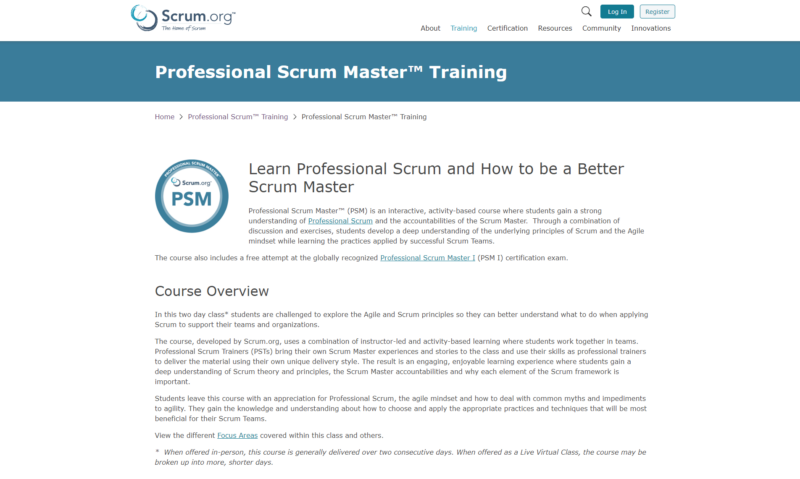
Training isn’t mandatory to sit the PSM exam; however, you’re encouraged
to take training classes to prepare yourself.
Individuals taking the 60-minute exam are expected to know about the scrum framework, values and scrum events such as sprint planning, sprint reviews and sprint retrospectives. Participants will also answer questions about self-managing teams, forecasting and release planning, backlog management and how to handle stakeholders and clients. You must score 85% to pass.
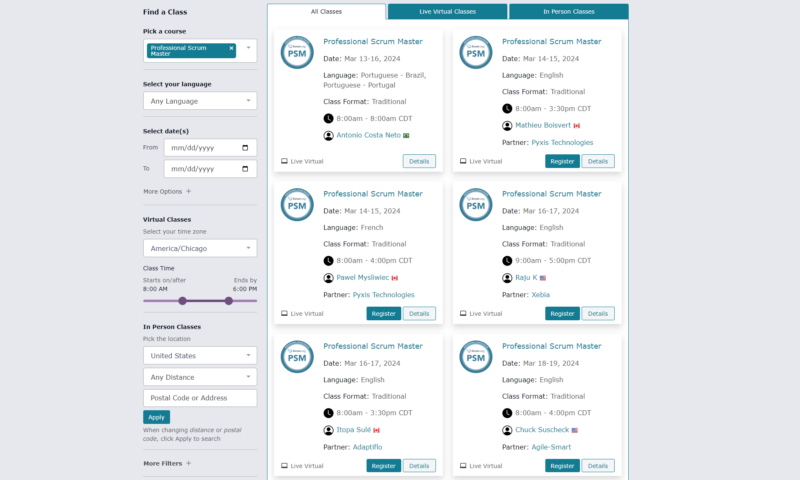
Plenty of CSM training classes are available for those wishing to attend one.
The PSM does not require training for the exam; however, it is encouraged. Courses such as Applying Professional Scrum (APS) and Professional Scrum Master training are available. It’s worth noting that the courses include one free PSM exam attempt. APS and Professional Scrum Master courses range in price from $1000 to $1500. You can also self-study if you prefer.
Key Benefits of PSM Certification
- No prerequisites: If you feel confident, you can sit the PSM exam without attending a PSM certification training course.
- No renewals: Once you have obtained the PSM certification, you’re not required to renew it.
- Proves expertise: The PSM I certification will show prospective employers that you have a sound understanding of scrum practices. It also opens up the opportunity to acquire more advanced scrum.org certifications, such as the PSM II, which leads to the PSM III.
What Is CSM (Certified Scrum Master)?
The Certified Scrum Master course and exam that the Scrum Alliance offers are a one-stop shop for those who wish to become scrum masters. The course-and-exam combo teaches and proves that individuals understand the scrum framework and scrum events and artifacts. You’ll also learn about team accountability and how to guide agile teams.
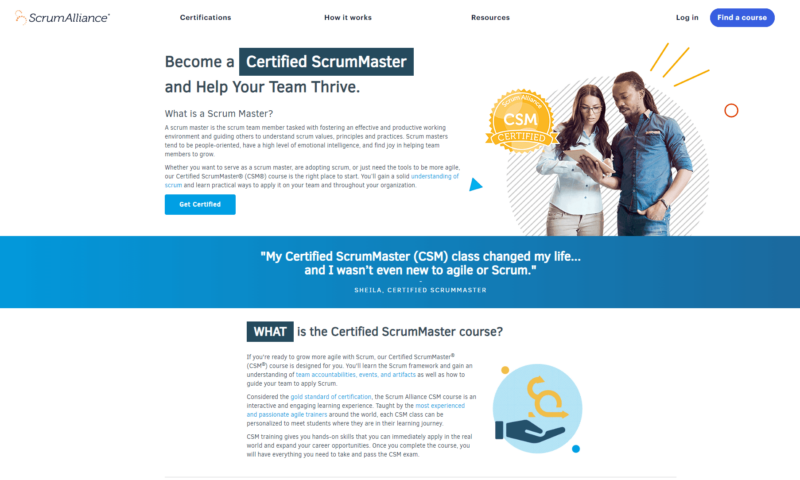
To sit the CSM exam, you must attend a mandatory training class.
Certified scrum masters and certified scrum trainers teach the CSM course. The mandatory 14-hour course, which typically spans two days, covers lean, agile and scrum, as well as scrum master core competencies, service to the development team, service to the product owner and service to the organization.
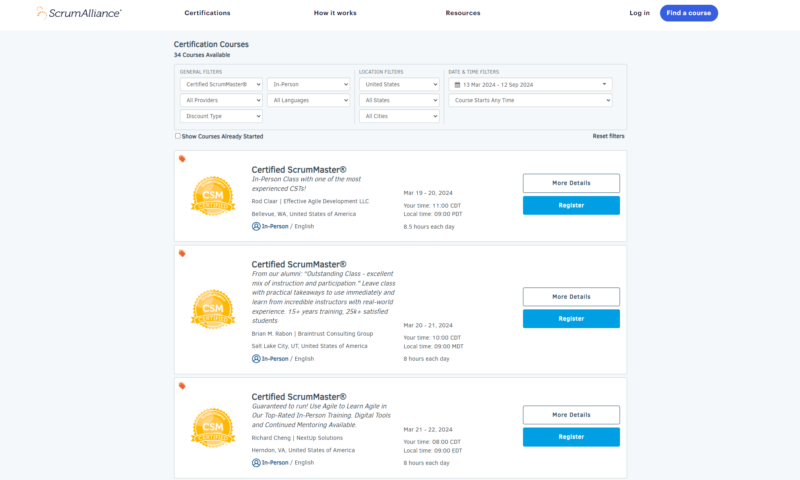
CSM training courses are offered online and in person.
Online CSM courses cost anywhere from $300 to more than $1000, while in-person classes cost between $850 and $1400. To pass the 60-minute exam, you must correctly answer 37 out of 50 questions. Scrum Alliance certifications must be renewed every two years. Renewal requirements include earning 20 Scrum Education Units (SEUs) and paying a $100 fee.
Key Benefits of CSM Certification
- Practical application: The CSM certification proves that you have the skills and knowledge to implement the scrum framework and lead teams to success.
- Career opportunities: Many project management professionals consider the CSM certification the gold standard. As such, you could gain access to better-paying jobs.
- Further education opportunities: The CSM certification will enable you to consider obtaining more advanced Scrum Alliance certifications, such as the A-CSM or CSP-SM.
CSM vs PSM Certification: Key Differences
Now that you have a better understanding of what the PSM and CSM certifications offer, it’s time to examine their key differences.
Accrediting Bodies
The Scrum Alliance offers the CSM certification, while scrum.org offers the PSM certification. Both bodies are highly regarded, so you need not worry about which organization is best. Pick the course that sounds right for you, and do not worry about the name of the accrediting body.
Certification Prerequisites
Each scrum exam has different prerequisites. Before you can sit the CSM exam, you must attend a training class facilitated by a certified agile coach. If you want to take the PSM exam, you do not need to participate in any training classes, though it is recommended.
Training Duration
If you plan on sitting the CSM exam, you can expect to spend at least two days (a minimum of 14 hours) in real or virtual classrooms, after which you’ll be ready to take the exam. If you take the PSM exam, the amount of studying you do in your own time will determine the training duration, unless you attend training classes, which typically last two days.
Certification Exam Difficulty Levels & Passing Scores
The PSM exam is considered to be more challenging than the CSM exam. You must score 85% or higher to pass. The CSM exam features 50 questions, and you must answer 37 questions (74%) correctly to pass.
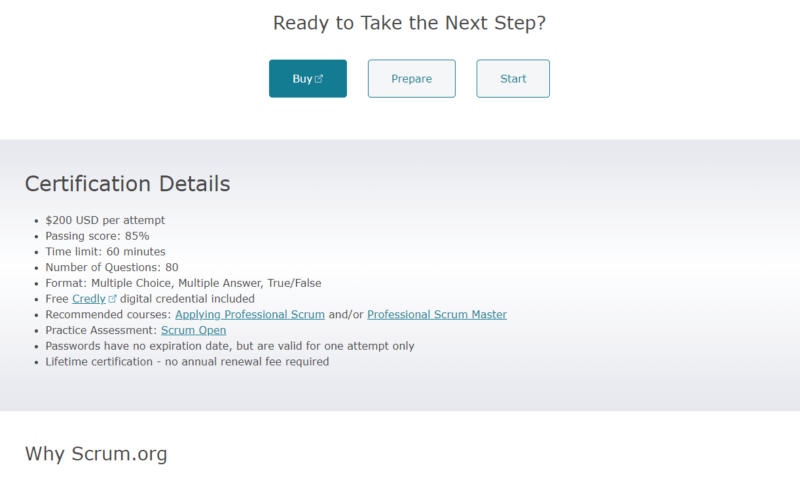
The details of the PSM certification are clearly listed on scrum.org’s website.
Exam Format
The 60-minute PSM exam features 80 multiple-choice, multiple-answer and true-or-false questions, while the 60-minute CSM exam has 50 multiple-choice questions.
Exam Costs
The CSM test is included in the price of the mandatory training course. However, should you fail your first two attempts, you’ll need to pay an additional $25 every time you retake the exam. Similarly, the PSM exam fee is included if you attend a PSM or an APS training class. However, if you want to take the exam after self-studying, the cost is $200 per attempt.
Exam Preparation
If you choose the Certified Scrum Master certification, a certified instructor will prepare you for the exam during mandatory training. If you forgo a PSM training class, you’ll be left to your own devices. You can self-study for the PSM by reading about the professional scrum competencies, which are available on scrum.org’s website.
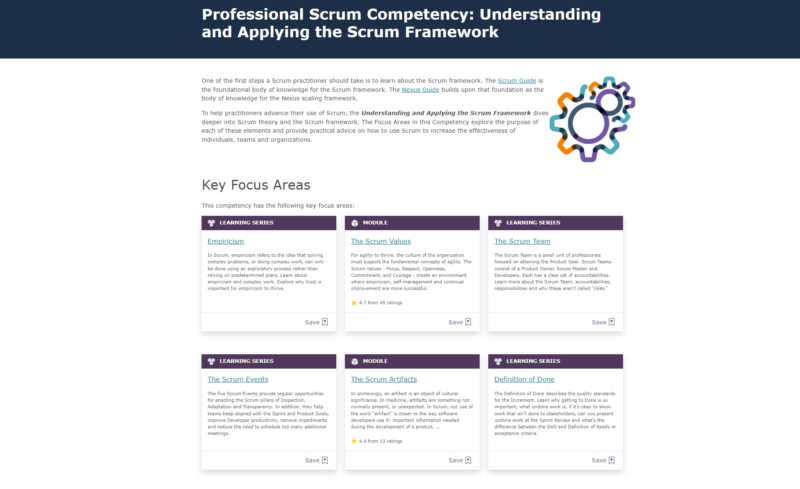
Professional scrum competencies are published on scrum.org’s website
and can be used to self-study for the PSM exam.
Renewal Requirements
CSM and PSM certifications have different renewal requirements, which can impact you financially. The Scrum Alliance requires you to renew your CSM certificate every two years. For renewal, you must have earned 20 SEUs (Scrum Education Units) and pay $100. The PSM certification is valid for life and does not need to be renewed.
Learning Outcomes & Potential Opportunities
Both PSM and CSM certification will lead to better job opportunities, as they prove you understand scrum and how to implement it. Additionally, each certification may prepare you to move into different roles. Scrum masters often become professional scrum product owners (PSPOs) or certified scrum product owners (CSPOs) after gaining scrum experience.
PSM vs CSM Salary Potential
A huge benefit of holding a certification is the potential to earn significantly more money. CSM and PSM holders can easily make more than six figures annually. On average, PSM holders earn $120,688 annually in the U.S.,2 while CSM holders average $112,999 annually in the United States.1
PSM vs CSM Certification Process
How to Get a PSM Certification:
- Decide whether you want to self-study or attend a training class.
- Study the professional scrum competencies if you’re self-studying or find and attend a training class to prepare for the exam.
- Apply to take the PSM exam. If you take a training class, you’ll have one free attempt; if you’re self-studying, you’ll need to pay the $200 exam fee.
- Take the 60-minute, 80-question exam and score 85% or higher to pass.
How to Get a CSM Certification:
- Find an online or in-person CSM training course on the Scrum Alliance website.
- Attend the class. Make sure a certified professional teaches the one you choose and that the class lasts at least 14 hours.
- Once you have completed the course, take the exam.
- You must answer 37 out of 50 questions correctly (74%) to pass the 60-minute exam.
- Over the next two years, earn 20 SEUs and pay a $100 fee to renew your certification.
Final Thoughts
If you’ve decided to step into a professional agile leadership role as a scrum master, congratulations. We hope our PSM vs CSM guide has helped you decide which certification to obtain. Either choice will lead to you gaining peer recognition, enhanced job opportunities and increased earning potential, and will open the door to future learning opportunities.
Which certification do you think suits you best? Are you a self-studier, or do you prefer certifications that require classroom attendance? Do you have aspirations beyond the role of scrum master? Let us know in the comments, and as always, thanks for reading.
FAQ: Scrum Master Certifications
-
Both CSM and PSM certifications are great options; however, the PSM certification is ideal for those who want to prove they have a deep understanding of scrum, while the CSM is for those who wish to learn how to implement scrum.
-
Absolutely! With the PSM certification in your hands, you can expect to be considered for better jobs, make more money and earn your peers’ respect.
-
The PSM and PMP certifications are completely different beasts. The CSM will prove that you can implement scrum and lead agile scrum teams. The PMP certification will prove that you can lead traditional and agile teams, implement many project management methodologies and manage complex projects from start to finish.
-
No, the Certified Scrum Master (CSM) exam is not harder than the Project Management Professional (PMP) exam. Though the CSM exam isn’t easy, the PMP exam is significantly more challenging, as it covers a much wider variety of topics. Additionally, in order to sit the PMP, you must meet stringent educational and work experience requirements.
Both CSM and PSM certifications are great options; however, the PSM certification is ideal for those who want to prove they have a deep understanding of scrum, while the CSM is for those who wish to learn how to implement scrum.n”}},{“@type”:”Question”,”name”:”Is the PSM Certificate Worth It?”,”acceptedAnswer”:{“@type”:”Answer”,”text”:”
Absolutely! With the PSM certification in your hands, you can expect to be considered for better jobs, make more money and earn your peersu2019 respect.n”}},{“@type”:”Question”,”name”:”Is PSM Better Than PMP?”,”acceptedAnswer”:{“@type”:”Answer”,”text”:”
The PSM and PMP certifications are completely different beasts. The CSM will prove that you can implement scrum and lead agile scrum teams. The PMP certification will prove that you can lead traditional and agile teams, implement many project management methodologies and manage complex projects from start to finish.n”}},{“@type”:”Question”,”name”:”Is CSM Harder Than PMP?”,”acceptedAnswer”:{“@type”:”Answer”,”text”:”
No, the Certified Scrum Master (CSM) exam is not harder than the Project Management Professional (PMP) exam. Though the CSM exam isnu2019t easy, the PMP exam is significantly more challenging, as it covers a much wider variety of topics. Additionally, in order to sit the PMP, you must meet stringent educational and work experience requirements.n”}}]}]]>
Sources:
- CSM salary
- PSM Salary
- Scrum Master Job Outlook
Let us know if you liked the post. That’s the only way we can improve.
